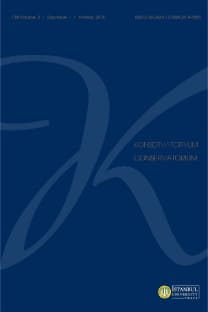SES VE KİŞİLİK İLİŞKİSİ BAĞLAMINDA SES EĞİTİMİNE BİR YAKLAŞIM
Bu makalede ses ve kişilik arasındaki ilişki irdelenmiş ve bu ilişkinin anlaşılmasının
AN APPROACH TO VOCAL TRAINING IN CONTEXT OF THE RELATIONSHIP BETWEEN VOICE AND PERSONALITY
In this article, the relationship between voice and personality has been studied, and itwas pointed out that understanding this relationship is one of the key points that theteacher should pay attention to during voice education in order to find the student’s ownvoice. Voice and Word have been assigned various meanings within cultural history;especially, human voice has been subject to many mystical and philosophical texts. Voiceand personality was derived from the same Latin word. The word “persona” consists ofper: for, and sona: (sound) voice; therefore, it is a compound word. It also means “Mask”and in many languages the word “personality” is derived from it. According to Carl GustavJung, “persona” or “mask” is the attitude an individual has towards life. Throughoutchildhood, the individual acts solely on his/her own desires, but as he/she grows old, theindividual learns how to play a certain role in order to get what he/she wants. If we applythe same theory to voice, the individual who copies different role models is departed fromhis/her natural voice by narrowing down the limits and possibilities of his/her own voice.In vocal training, whether it is conducted verbally or musically, the trainer has to analyzeand resolve this relationship. By breaking the habits and conditionings of the trainee, he/she should pave the way for finding the trainee’s own unique voice. Doing vocal exerciseshelps overcome emotional obstacles, which results in improvement of the voice. Vocaleducation should be a field of constant learning for both the trainee and the trainer. In the“Results and Discussion” section of the article, pedagogical elements of voice educationin terms of voice-personality relationship are specified.
Keywords:
Voice, Personality,
___
- Bennett, E.A. (2006). Jung Aslında Ne Dedi. (Çev.: Işıl Çobanlı), İstanbul: Say Yayınları. (Orijinal kitabın yayın yılı: 1966).
- Campbell, D. (2002). Mozart Etkisi. (Çev.: Feryal Çubukçu). İstanbul: Kuraldışı Yayınları. (Orijinal kitabın yayın yılı: 1997).
- Dağdelen, Y. (2011). Diksiyon. İstanbul: Pan Yayıncılık.
- Kabaağaç, S. & Alova, E. (1995). Latince-Türkçe Sözlük. İstanbul: Sosyal Yayınlar.
- Linklater, K. (2006). Freeing the Natural Voice. London: Nick Hern Books,
- Sachs, K. (1965). Kısa Dünya Musikisi Tarihi. (Çev.: İlhan Usmanbaş). İstanbul: Milli Eğitim Basımevi. (Orijinal kitabın yayın yılı: 1949).
- Taşer, S. (1980). Örneklerle Konuşma Eğitimi. İstanbul: Örgün Yayınları.
- ISSN: 2146-264X
- Yayın Aralığı: 2
- Başlangıç: 2011
- Yayıncı: İstanbul Üniversitesi Devlet Konservatuvarı
